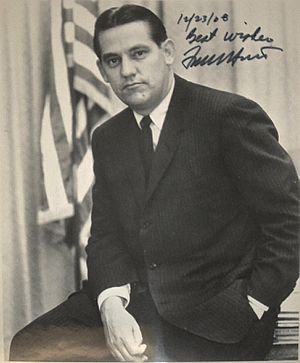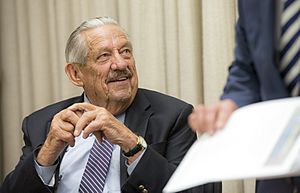Fred R. Harris facts for kids
Quick facts for kids
Fred R. Harris
|
|
|---|---|

Harris in the United States Senate, 1968
|
|
| 32nd Chair of the Democratic National Committee | |
| In office January 14, 1969 – March 5, 1970 |
|
| Preceded by | Larry O'Brien |
| Succeeded by | Larry O'Brien |
| United States Senator from Oklahoma |
|
| In office November 4, 1964 – January 3, 1973 |
|
| Preceded by | J. Howard Edmondson |
| Succeeded by | Dewey F. Bartlett |
| Member of the Oklahoma Senate from the 17th district |
|
| In office 1957–1964 |
|
| Preceded by | Bill Logan |
| Succeeded by | Ralph W. Graves |
| Personal details | |
| Born | November 13, 1930 Walters, Oklahoma, U.S. |
| Died | November 23, 2024 (aged 94) Albuquerque, New Mexico, U.S. |
| Political party | Democratic |
| Spouses |
Margaret Elliston
(m. 1982) |
| Children | 3 |
| Education | University of Oklahoma (BA, LLB) |
Fred Roy Harris (born November 13, 1930 – died November 23, 2024) was an American politician. He was a member of the Democratic Party. Harris served as a United States Senator for Oklahoma from 1964 to 1973.
Born in Walters, Oklahoma, Harris first served in the Oklahoma Senate. He then won a special election to become a U.S. Senator. In the Senate, he supported programs to help people and spoke out about the Vietnam War. He was also the chairman of the Democratic National Committee for a time. After his time in the Senate, he ran for president twice. Later in life, he became a professor.
Contents
Early Life and Education
Fred Roy Harris was born on November 13, 1930, in Walters, Oklahoma. His father, Fred Byron Harris, was a sharecropper, meaning he farmed land and paid rent with a share of the crops.
In 1949, Fred Harris married LaDonna Crawford. He went to the University of Oklahoma (OU) on a scholarship. He earned a bachelor's degree in history and political science in 1952. After that, he studied law at OU and became a lawyer in 1954.
In 1956, Harris was elected to the Oklahoma Senate. He served there until 1964. During this time, he worked to pass laws that would stop race discrimination in state jobs. He also ran for governor of Oklahoma in 1962, which helped him become more well-known across the state.
Serving in the United States Senate
In 1964, Fred Harris ran for the U.S. Senate. He wanted to finish the term of Senator Robert S. Kerr, who had passed away. Harris won the election, becoming one of the youngest U.S. Senators at just 33 years old. His time in the Senate began on November 4, 1964.
Harris strongly supported President Lyndon B. Johnson's Great Society programs. These programs aimed to reduce poverty and racial injustice in America. He voted for important laws like the Voting Rights Act of 1965. He also supported the Civil Rights Act of 1968, which worked to end discrimination.
In 1967, President Johnson asked Harris to join the Kerner Commission. This group studied the causes of civil unrest in cities. Harris cared deeply about helping Black city residents who faced economic hardship. He also supported programs for farmers, river navigation, and Native American health, which were popular in Oklahoma.
Even though his views were often more liberal than many in his home state, Harris was reelected to a full Senate term in 1966. He won despite his opponent trying to use the issue of prayer in public schools against him. Harris believed in the separation of church and state.
During his time in the Senate, Harris also served as chairman of the Democratic National Committee. In 1968, he was considered as a possible running mate for presidential candidate Hubert Humphrey. However, Humphrey chose someone else because Harris was quite young at 37. Harris later disagreed with President Johnson and Humphrey about the Vietnam War.
In 1970, Harris played a big part in returning 48,000 acres of sacred mountain land to the Taos Pueblo people. This land, including Blue Lake, had been taken by the government years before. To get the bill passed, Harris worked with President Richard Nixon, even though they disagreed on many other issues. This showed his ability to work across political lines for important causes.
Presidential Campaigns
Fred Harris decided not to run for another Senate term in 1972. Instead, he ran for president that year, but his campaign ended after only 48 days. He tried again four years later, in 1976.
Both of his presidential campaigns focused on "economic democracy". This idea meant giving more power and opportunities to everyday people, especially the working class. He also supported desegregation busing and Native American rights. To save money, he traveled the country in a recreational vehicle (RV) and stayed in people's homes. He would give his hosts a fun card that said it was good for one night's stay in the White House if he won!
After a surprisingly good start in the 1976 Iowa caucuses, Harris joked that he had been "winnowed in" (meaning he was still in the race). However, he eventually dropped out of the contest a few months later.
Later Life and Legacy

After 1976, Fred Harris left politics and became a professor of political science at the University of New Mexico. He wrote many books about politics. He also wrote three novels. He lived in Corrales, New Mexico.
In 1981, Fred Harris and his first wife, LaDonna, divorced. The next year, he married Margaret Ellinson. He had three children from his first marriage.
Fred Harris stayed active even in his later years. He continued to share his political views and supported President Joe Biden. He also wrote a memoir, Report from a Last Survivor, which was published in 2024.
Fred Harris passed away on November 23, 2024, in Albuquerque, New Mexico, just ten days after his 94th birthday.
See also
 In Spanish: Fred R. Harris para niños
In Spanish: Fred R. Harris para niños
 | Selma Burke |
 | Pauline Powell Burns |
 | Frederick J. Brown |
 | Robert Blackburn |

